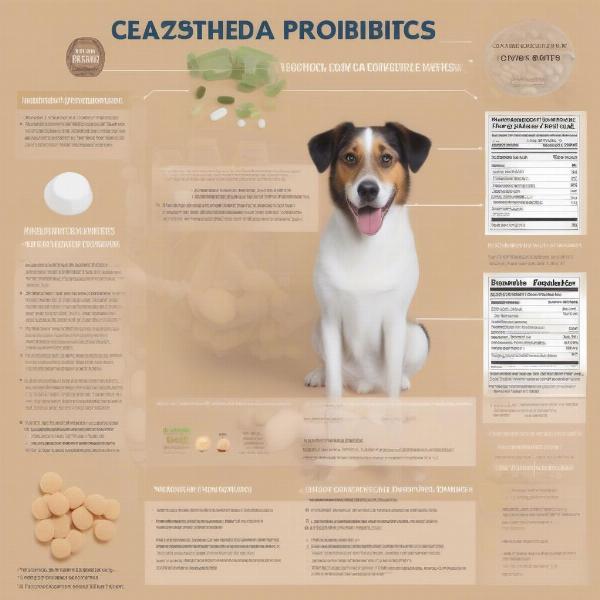Probiotics are increasingly popular for supporting dog health. But with so many options, finding the best natural probiotic for dogs can be challenging. This guide explores the benefits of probiotics, helps you choose the right one for your furry friend, and provides tips for incorporating them into your dog’s diet.
Understanding the Benefits of Probiotics for Dogs
Probiotics are live microorganisms that, when administered in adequate amounts, confer a health benefit on the host. They primarily support gut health, where they help balance the intestinal flora. This balance is crucial for proper digestion, nutrient absorption, and a strong immune system.
A healthy gut contributes significantly to a dog’s overall well-being. Probiotics can help alleviate digestive issues like diarrhea, constipation, and gas. They can also be beneficial during and after antibiotic treatment, which can disrupt the gut’s natural bacterial balance. chicory root for dogs
Signs Your Dog Might Need Probiotics
How do you know if your dog could benefit from probiotics? Look out for these signs:
- Frequent diarrhea or loose stools
- Chronic constipation
- Excessive gas
- Bad breath
- Skin allergies
- Weakened immune system
Choosing the Best Natural Probiotic for Dogs
Not all probiotics are created equal. When choosing a probiotic for your dog, consider the following factors:
- Strain Specificity: Look for probiotics specifically formulated for dogs, containing strains that have been shown to be beneficial for canine health.
- CFU Count: CFU (Colony Forming Units) indicates the number of live bacteria in the product. A higher CFU count generally suggests a more potent probiotic.
- Ingredients: Opt for natural ingredients and avoid artificial flavors, colors, and preservatives.
- Storage: Some probiotics require refrigeration to maintain their viability.
- Palatability: Choose a probiotic that your dog will readily consume, whether it’s a powder, chew, or capsule.
 Different Types of Dog Probiotics
Different Types of Dog Probiotics
What are some examples of good probiotic strains for dogs?
Some beneficial strains for dogs include Bifidobacterium animalis, Lactobacillus acidophilus, Enterococcus faecium, and Lactobacillus rhamnosus. These strains have been shown to support digestive health and boost the immune system in dogs. kefir milk for dogs
Incorporating Probiotics into Your Dog’s Diet
Once you’ve chosen a probiotic, incorporating it into your dog’s diet is usually straightforward. Most probiotics can be mixed with food or given directly. Start with a small dose and gradually increase it as needed. Always follow the manufacturer’s instructions and consult your veterinarian if you have any concerns.
How long does it take to see results from using probiotics?
It can take anywhere from a few days to a few weeks to see noticeable improvements in your dog’s health after starting probiotics. Consistency is key, so be patient and continue administering the probiotic as directed. probiotics dogs
Can I give my dog human probiotics?
While some human probiotics may contain similar strains as dog probiotics, it’s generally recommended to use products specifically formulated for dogs. Human probiotics may not contain the correct strains or dosages for optimal canine health.
Conclusion
Choosing the best natural probiotic for dogs involves careful consideration of various factors, including strain specificity, CFU count, and ingredients. By understanding the benefits of probiotics and selecting the right product, you can support your dog’s digestive health, boost their immune system, and contribute to their overall well-being. Remember to consult your veterinarian before starting your dog on any new supplement, including probiotics.
FAQ
- What are the benefits of probiotics for dogs? Probiotics support gut health, aid digestion, boost the immune system, and can help with issues like diarrhea and constipation.
- How do I choose the right probiotic for my dog? Look for dog-specific strains, a high CFU count, natural ingredients, and consider storage and palatability.
- How do I give my dog probiotics? Most probiotics can be mixed with food or given directly. Follow the manufacturer’s instructions.
- How long does it take to see results? It can take a few days to a few weeks to see improvements. Consistency is important.
- Can I give my dog human probiotics? It’s best to use probiotics formulated specifically for dogs.
About ILM Dog
ILM Dog is your trusted source for expert advice on all aspects of dog care, from breed selection and health to training, nutrition, and grooming. We provide reliable, practical information to help dog owners worldwide provide the best possible care for their furry companions. We offer specialized guidance in breed selection, health management, training techniques, optimal nutrition plans, and grooming tips. Contact us for expert advice on all your dog care needs. Email: [email protected], Phone: +44 20-3965-8624.